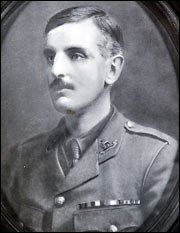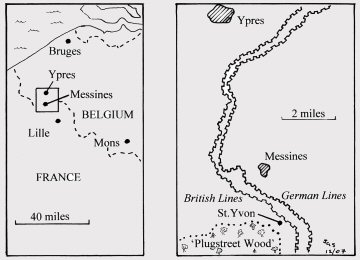![]() ALAN REED
ALAN REED
New evidence from a Captain's diary
![]()
On Boxing Day, December 25th, 2007 the Daily Telegraph published an article referring to a newly-discovered eyewitness account of the events of the Christmas Truce of 1914. Almost a week later, on New Year's Eve, there was further coverage in the BBC TV Midlands News. In this article my friend Alan Reed, who played an important part in the discovery of this new evidence, gives a fuller version of the story.
CHRISTMAS 1914
On the first Christmas of the Great War in 1914, some remarkable events took place in some sectors of what was to become known as the Western Front. Soldiers from both sides fraternized in No Man's Land in a great act of shared humanity and some of these 'strange meetings' were captured on photographs. Carols were sung. Football matches were improvised and, in one, the Saxons are supposed to have won by 3 goals to 2, a German officer having refereed the game! Small presents were exchanged: food, cigars, even tunic buttons. In one singular incident a soldier from the Rifle Brigade had his hair cut by his German barber who had been in London before the War. It was also a time when bodies in No Man's Land could be buried.

Christmas 1914 - how it dawned for many
THE WARWICKS AND THE DISCOVERY OF THE DIARY
One of the units involved in this Truce was the 1st Battalion of the Royal Warwickshire Regiment. The 'Warwicks' had joined the B.E.F. (British Expeditionary Force) in late August 1914. By October they were on their way to Belgium south of Ypres ('Wipers' to the troops) when Lieutenant B.L.Montgomery ('Monty' of Second World War fame) was wounded. Another famous soldier from the Warwicks was Bruce Bairnsfather who created the morale-boosting famous cartoon character of 'Old Bill' in a ruined cottage behind the lines in the hamlet of St.Yvon on the edge of 'Plugstreet' Wood south of Messines. It is at St.Yvon that the Warwicks spent Christmas Day. The entry in their diary for 25th December records
"….a local truce. British and German intermingle between the trenches. Dead in front of trenches buried. No shot fired all day. No casualties"
That succinct account does not mention that the truce had to be arranged by officers in the line and one of them was Captain Robert Hamilton.
The discovery of the involvement of Captain Hamilton came about as one of those chance encounters which make historical research all the more rewarding. I was due to guide a party of school girls from Warwick, amongst them Alice Hamilton. At the end of my pre-visit talk at the school, her father, Andrew Hamilton, asked me if I would be interested in seeing the war diary of his grandfather Robert Hamilton. Every primary source material can be revealing. It allows one to be 'close' to the man and it opens up new angles. I duly accepted his offer and, before long, I realized that there were details of historical importance in the neatly typed pages.
| CAPTAIN ROBERT HAMILTON'S CHRISTMAS
TRUCE
The diary covers the dates from 5th August 1914 to 12th January 1915. He was sent to the Royal Warwicks from the Norfolk Regiment. He was promoted to Captain on 16th September. On the 9th he wrote in his diary:
|
 |
On Christmas Eve the Warwicks relieved the Royal Dublin Fusiliers at St.Yvon in the early evening. Captain Hamilton heard from the 'Dubs' that
"the Germans wanted to talk to us".
Having settled down in the front line trench Captain Hamilton heard the Germans shouting, "are you the Warwicks? to which our own men replied 'come and see'. They said, "You come half way, and we will come half way and bring you some cigars".
This went on for some time and one can imagine the indecision in that trench, men thinking "do I get shot if I show myself?" It is at that sort of time that some decide that it is their moment. Private Gregory thought that it was "his" moment.
Captain Hamilton had referred to Gregory in his entry of 26th November:
"My new servant Pte. Gregory ('double ginger' of Truce fame) cannot make tea or anything approaching the taste of it".
Gregory asked Hamilton "if he might go out halfway" to which Hamilton replied "Yes at your own risk".
"Pte.Gregory stepped over the parapet, and got half way, and was heard saying 'well here I am, where are you'. Come half way they said, so on went Gregory, until he came upon two unarmed Germans, and one fully armed, lying down just behind, with his rifle pointed at him. Typically German. Gregory was unarmed and alone. Typically British. He got his cigar and spun them some magnificent yarns about the strength of his company, which amused us all very much when he told us later. They wanted me to meet their officer, and after a great deal of shouting across, I said I would meet him at dawn, unarmed".
Then came Christmas Day, and Hamilton writes:
"Xmas Day - I went out and found a Saxon officer of the 134th Saxon Corps, who was fully armed. I pointed to his revolver and pouch. He smiled and said seeing I was unarmed, 'Allright now', we shook hands, and said what we could in double dutch, arranged a local armistice for 48 hours, and returned to our trenches. This was the signal for our respective soldiers to come out. As far as I can make out this effort of ours extended itself on either side for some considerable distance. The soldiers on both sides met in their hundreds, and exchanged greetings and gifts. We buried many Germans, and they did the same to ours".
Swapping buttons
Amongst the Saxons was:
"….the chef of the Trocadero……..who seemed quite delighted to meet some of his former clients".
Hamilton then appeared to have played a joke on the unsuspecting Germans when they said that Russia "was washed out". Hamilton had been met by Lieutenant Campbell of the Irish Fusiliers who did not believe what was taking place in No Man's Land. Campbell had a "magnificent black beard" so Hamilton took him to the Germans and said:
"what about this Russian; they looked distinctly disappointed".
| Afterwards Hamilton went to an improvised concert in his line. He
concludes his entry for 25th December thus:
The truce, "no firing", continued until the Warwicks were relieved by the Dubs on 28th December. Hamilton saw the New Year in with Bruce Bairnsfather who
|
|
Captain Robert Hamilton and all those who took part in the Christmas Truce did not realize at the time what momentous events they were experiencing and the symbolic significance of their action. They showed to the rest of the world and to those in authority who had the power to stop the War what 'ordinary' men could achieve if they were allowed 'to get on' with their lives - a message all too relevant ninety or so years on.
Notes:
1. The Bruce Bairnsfather drawings used to illustrate this article are reproduced by kind permission of Mark Warby - Editor, "The Old Bill Newsletter" - mark@brucebairnsfather.org.uk
2. For a full and well researched account of the Christmas Truce of 1914 refer to the book "Christmas Truce" by Malcolm Brown and Shirley Seaton (1984, revised 1994).
3. The diary of the 1st Battalion Royal Warwickshire Regiment is held at The Royal Regiment of Fusiliers Museum (Royal Warwickshire) at St.John's House in Warwick.
4. Maps (by courtesy of George Sayell) showing the area in which Capt. Hamilton spent Christmas, 1914

![]()
 Copyright © Alan Reed, December,
2007
Copyright © Alan Reed, December,
2007
Return to the Hellfire Corner Contents Section